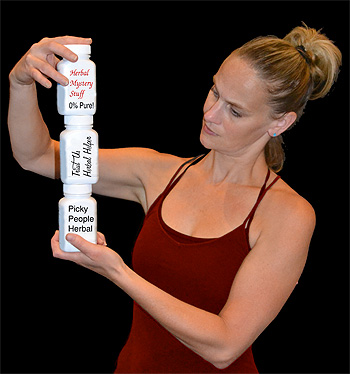CLA
(Conjugated Linoleic Acid)
What is it?
It's a trans fatty acid first identified in 1978. It is not a single substance. There are actually 28 possible isomers of linoleic acid.
(WAY TOO MUCH INFORMATION: An isomer is when there are two or more substances, made up of identical elements in identical proportions, that have different properties because of differences in the arrangement of their atoms.)
Technically speaking, "CLA refers to a mixture of positional and geometric isomers of linoleic acid (18:2 n-6) in which the double bonds are conjugated instead of existing in the typical methylene interrupted configuration." (Thanks to Quackwatch.org for that definition.)
Does it occur naturally in the body?
No, but there is some evidence that when CLA is ingested, it can be secreted in human breast milk and appears in blood and tissue. It is found in the meat and dairy products of hoofed animals as well as vegetable fats. Many supplement companies get their CLA from safflower and sunflower oils.
What are the claims?
CLA is promoted as a weight-loss drug, as an aid to build muscle and as a deterrent to heart disease and diabetes. There are even companies that have made fantastical leaps from rodent studies and claim it's an immune system booster or a cure for cancer.
Does it work?
Yes, but not in the way people had hoped. In 2000, Erling Thom and Ola Gudmundsen of Scandinavian Clinical Research concluded that "CLA reduces body fat but not body weight in healthy exercising humans of normal body weight."
It's not exactly the rousing endorsement CLA supplement companies were hoping for, but more studies were coming. Over the next few years, some studies showed small weight loss, while others showed no benefit at all.
A study presented in Los Angeles at Digestive Disease Week 2006 showed that obese or overweight people who took CLA supplements daily lost weight versus those taking a placebo. Unfortunately, the subjects only lost an average of 3 pounds...after 6 months of CLA...and the study was funded by Lipid Nutrition...a manufacturer of CLA weight loss products. As if that wasn't suspect enough, the chief researcher was Sandra Einerhand, an employee of Lipid Nutrition.
In March, the American Journal of Clinical Nutrition reported that in another study, researchers concluded obese people who took CLA supplements for a year didn't lose any more weight than those on a placebo.
One of the most quoted studies was one reported on in 2006 called "The Norwegian Study." In that experiment, 60 participants were not allowed to diet, but they took CLA, and they lost weight. The weight loss was " equal to a 160-lb person losing 2-3 lb over three months", says researcher Ola Gudmundsen, PhD, managing director of Scandinavian Clinical Research.
Sounds pretty good, right?
It's not. Consider the average diet and exercise program is designed to help people lose 1-2 pounds a week, not over three months.
What are the dangers?
As of September 2007, researchers still aren't even sure how CLA works. What they do know is it can have some negative effects. In several studies, the subjects who took doses higher than 3 grams of CLA daily had slightly higher LDL or "bad" cholesterol and slightly lower HDL or "good" cholesterol compared to the control groups.
Most of the studies widely quoted administer CLA in dosage amounts from 3 to 6 grams daily.
People who took CLA also had higher leptin and lipoprotein levels. Leptin is thought to be a heart disease marker, while lipoprotein is also a marker of heart disease and inflammation. The only thing proponents of CLA supplementation suggest to deal with this problem is a short statement we found at the bottom of one website, "it may be wise for those using CLA to have their blood fats monitored by a physician."
That's not all. CLA subjects also had higher white blood cell counts, which could lead to damaging artery inflammation.
To top it all off, new research is showing that the CLA found in pill form may PROMOTE insulin resistance, raising glucose levels. (Not something you want to do.)
SPECIAL NOTE: Although CLA is found in food products like yogurt, milk and butter, it's not nearly the levels used in clinical research. Most studies use 3 to 6 grams of CLA supplements daily. It would take about 108 servings of yogurt to get 3 grams of CLA, the minimum dosage used in many studies.
The Bottom Line
CLA is a trans fat. That's a type of fat that has been classified as so detrimental to your health; the National Institute of Medicine has stated that there are NO safe levels of trans fats in the diet. CLA Supplement manufacturers claim it's perfectly safe, but their claims are not backed up by the science.
Knowledge of the risks and benefits of CLA are far too rudimentary for us to suggest anyone consider CLA supplementation. If you're trying to build muscle and lose fat, do what doctors have been recommending for decades. Exercise and eat a nutritionally balanced diet.
We cannot recommend the supplement CLA.
Links for More Info
| Centers for Disease Control and Prevention http://www.cdc.gov/ |
|
| United States Food and Drug Administration (FDA) http://www.fda.gov/ |
|
| Herbs, Botanicals & Other Products - Extensive Information from the Memorial Sloan-Kettering Cancer Center https://www.mskcc.org/cancer-care/diagnosis-treatment/symptom-management/integrative-medicine/herbs |
|
| National Center for Complementary and Integrative Health - Overviews on Herbal Treatments and Supplements https://www.nccih.nih.gov/health/herbsataglance |
|
| National Institutes of Health http://www.nih.gov/ |
|
| National Institutes of Health - Office of Dietary Supplements https://ods.od.nih.gov/ |
|
| Operation Supplement Safety https://www.opss.org/ |
|
| United States Department of Agriculture http://www.USDA.gov/ |
|
| WebMD - Helping you make better decisions for life. http://www.webmd.com/ |
|
We at WeBeFit DO NOT recommend ANY supplements to ANY of our clients. ONLY a licensed Nutritionist or Medical Doctor can make those recommendations based on your individual needs.
This is being provided for INFORMATIONAL and EDUCATIONAL purposes only.
CAUTION: These supplements have not been evaluated by the Food and Drug Administration (FDA) for safety, effectiveness or purity. There may be unknown risks associated with taking any supplements. There are no regulated manufacturing standards for companies that make supplements. There have been instances where herbal or health supplements have been sold that were contaminated with toxic substances. If you should choose to purchase herbal or health supplements, please only purchase them from a reliable source to minimize the risk of contamination.
If you should decide to use ANY supplement, ALWAYS consult your doctor or Nutritionist first.
9/30/2007
Updated 5/31/2011











